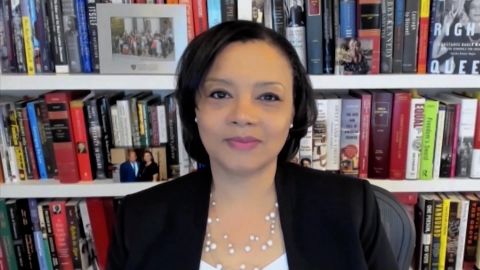Read Transcript EXPAND
CHRISTIANE AMANPOUR: Our next guest is Tomiko Brown-Nagin, an award-winning legal historian and dean of the Harvard Radcliffe Institute. Her latest book, “Civil Rights Queen,” recognizes the path paved by one of Brown’s idols, Constance Baker Motley. And she joins Michel Martin to discuss then and now.
(BEGIN VIDEOTAPE)
MICHEL MARTIN, CORRESPONDENT: Thanks, Christiane. Dean Tomiko Brown-Nagin, thank you so much for joining us.
TOMIKO BROWN-NAGIN, DEAN, HARVARD RADCLIFFE INSTITUTE: Happy to be with you.
MARTIN: You’re a dean of a graduate division at Harvard University. You’re a professor of law and a professor of history. So I’m just wondering — I’m guessing that, in that capacity, you interact with a lot of students. Do you have a sense of what this nomination means to them, particularly young women interested in careers in the law?
BROWN-NAGIN: Every Supreme Court nomination process, the hearings are always appointment TV for law students and for students more broadly who are interested in law, and never more so than with these hearings. Judge Jackson is inspiring. As she herself noted, she has been receiving lots of letters from young girls who are looking to her and having their sense of what they can do in the world expanded. And I just that’s just great. It is a teaching moment for this country. The very fact of this woman, who is visibly diverse, an African-American woman sitting there at the table, and answering questions from these Senators, only one of whom is African-American, was just tremendous. It is a testament to progress in this country. Although, other aspects of the hearing were testaments to how far we still have to go.
MARTIN: You’re a legal historian. And I want to just read a little bit from a tribute to Justice Thurgood Marshall, who’s the first African-American to serve on the Supreme Court. This is from Justice Sandra Day O’Connor, who was the first woman to serve on the Supreme Court. And she talked about listening Justice Marshall talk eloquently to the media about the social stigmas and lost opportunities uttered by African- American children in state-imposed segregated schools. My awareness of race-based disparities deepened. I did not, could not know it then. But the man who would, as a lawyer and jurist, captivate the nation would also as a colleague and friend profoundly influence me. To what qualities, do you feel, Judge Brown Jackson will bring to the court that could be potentially reformative for the court, and perhaps, perhaps for the justice system themselves?
BROWN-NAGIN: I think her greatest asset lies in her experience with the criminal legal system, both as the niece of an individual who was incarcerated. As a lawyer for criminal defendants. As a U.S. District Court Judge where, in that capacity, she has seen every type of American. That is the beauty of the federal judicial system — the trial court, which I had the opportunity to clerk on. It’s just an amazing place. And in that role, she would have seen everyone, and she will have had deep and personal experiences with them that, I think, are vital to informing the conversations that are had among the justices about the various criminal law issues that arise. And there are quite a few. And it’s particularly important in this moment of what we’re calling, racial reckoning, for there to be a justice who has those experiences. I also think it’s important, Michel, that she grew up in Miami which is, of course, a gateway to Latin-America. We’ve never had a Supreme Court Justice who had that kind of variety and diversity in her racial experience. She talks about being a child of parents who grew up under Jim Crow. And I found that part so moving. We share that history. And so, she’s one generation removed from Thurgood Marshall’s experience. And I have every sense that she will make a tremendous contribution to the type of conversations that are had at the Supreme Court, and in many ways, raise the level.
MARTIN: You wrote for slate in an article about the fact that critics have seized on her two-year stint as a public defender, to portray her as a pawn of the imagined radical left. What do you make of that? She would be the first public defendant to sit on the high court. What do you make of the fact that at least in a run up to these hearings, this is the very thing that critics, sort of, pounced on her about?
BROWN-NAGIN: It’s exceedingly curious, Michel. And perhaps suggests that even those who tend to portray themselves as patriotic and as lovers of the constitution, may not truly understand what it means. The Sixth Amendment confers a right to counsel. It’s part of the bill of rights. It extraordinarily impart — extraordinarily important part of our constitutional system. The Supreme Court itself, held many years ago, that indigent criminal defendants are entitled to have counsel appointed when they can’t afford it themselves. And that’s because the entire judicial system depends on when the government charges a person with a crime, that individual having the right and the ability to effectively respond. The integrity of our legal system depends on public defenders participating in it.
MARTIN: What do you make of the confirmation process overall? I mean, it took — I mean, I don’t know if you would use this word. Just some of the questions seemed outright bizarre. I mean, clearly some of them were hostile. This is a Senator Ted Cruz questioning her about the influence of critical race theory on children. I’ll just play that.
SEN. TED CRUZ, R-TX: There are portions of this book, that I find, really quite remarkable. One portion of the book says, babies are taught to be racist or anti-racist. There is no neutrality. Another portion of the book, they recommend the babies confess when being racist. Now, this is a book that is taught at Georgetown Day School to students in pre-K through second grade, so four through seven years old. Do you agree with this book that is being taught with kids, that babies are racist?
KETANJI BROWN JACKSON, SUPREME COURT NOMINEE: Senator, I do not believe that any child should be made to feel as though they are racist or though they are not valued, or though they are less than, that they are victims, that they are oppressors. I don’t believe in any of that.
MARTIN: I don’t know what — I’m just — what do you make of it?
BROWN-NAGIN: I thought the hearings were disappointing. And largely, a missed opportunity to talk about the law. The wide range of subject areas that might come before Judge Jackson or that she should be conversant in as a nominee to the Supreme Court. It devolved into, basically, pure politics with Judge Jackson being asked any number of policy questions that she shouldn’t have had to answer including things like, whether there should be more or fewer police officers. And questions about average sentences for murderers. A lot of foregrounding of issues of crime. The whole foray into critical race theory, racist babies, and, of course, the fixation on child pornography. Now, let me say this, Michel. The Senators were certainly within their rights to ask about Judge Jackson’s sentences. Including because she has a background in sentencing policy, having served on the U.S. sentencing commission. And yet, it did become clear that there was an agenda to just focus on child pornography. And of course, there is a wider — a background to this where there are groups that evidently are fringe groups that are focused on this issue. And so, it really was, to a large extent — a circumstance where the Senators were — some of the Senators, I should say, were using the hearing as an opportunity to appeal to their constituencies. To draw distinctions between themselves and the Democratic Party. And Judge Jackson was just along for the ride. In many times, the Senators wouldn’t even let her speak. They kept interrupting her. And so, it was clear that they really didn’t want the answers. They just wanted to focus on their agendas. And it was sad and disappointing.
MARTIN: And so, let’s go back into history a bit. You know, in his speech at the White House after accepting President Biden’s nomination, Judge Brown Jackson expressed gratitude from Constance Baker Motley, the first woman to serve as a federal judge, of whom she called an inspiration. And deemed — in a remarkable timing, you just published a biography about Judge Motley’s life. I’m just wondering why you took her on, and tell us a little bit about her.
BROWN-NAGIN: As I said in the introduction to the book, Michel. I wanted to write the story of her life. First of all because she’s fascinating. She had a tremendous impact in three different phases of a career. First, as a civil rights lawyer for 20 years with the NAACP Legal Defense Fund, working alongside Thurgood Marshall. Then as New York politician. And finally, as the first black woman appointed to the federal judiciary. And I think that we don’t know — many people don’t know as much as they should about Motley because the way in which history, like society generally, is gendered. So, if the figures who are considered worthy of our historical memory tend to be men, and that is true even in the civil rights historiography. And I thought that, it’s a kind of historical malpractice not to know about Constance Baker Motley. And I was happy to spend so much time writing this book about her life and legacy. Including because she’s so relevant still, in many of the issues that she played a role in, as a lawyer and a judge, are still relevant to our time.
MARTIN: You noted in the book about how often there was an attempt. But first, she was an object of fascination by, you know, people would come to court just to stare at her, basically, because she was such a novelty, especially in those early days when she’s arguing these — she’s taking these, you know, very difficult civil rights cases in often hostile environments. Often hostile Southern Courts. And then, of course, again her advocacy came up again when she was nominated to the bench. Do you see parallels to the current moment even though the circumstances seem very different?
BROWN-NAGIN: I do see, as I mentioned, progress. After all, it’s because in part of Constance Baker Motley and Thurgood Marshall that Judge Jackson was able to attend integrated schools and to become a nominee, who has such imminent qualifications that this hasn’t been a focus of discussion. At the same time, I certainly see parallels in the way that some have sought to use what is Judge Jackson’s greatest asset, her practice background, against her in the very same way that Constance Baker Motley’s practice background and civil rights, including, on behalf of criminal defendants was used against her. There were those who said she should not be appointed to the federal judiciary because she had spent a career representing plaintiffs in civil rights cases. That, somehow, she couldn’t be fair because of that. Which, of course, was absurd coming from many who believed in and advocated segregation. And so, there are parallels. And yet, what I will choose to focus on is what Judge Jackson said, which is that, she is standing on the shoulders of Judge Motley. And I’m so glad that we have finally reached this moment in our history. And I hope that there are many more who are inspired as a result of our having reached this moment in American history.
MARTIN: Before I let you go. I just want to play another clip from the confirmation hearings. So, this is where the — Senator Cory Booker of New Jersey, he’s the only African-American on the Judiciary Committee at this moment. Offered words of reassurance and support. And it was quite an emotional moment, I think, for many people who observed. And here it is.
SEN. CORY BOOKER (D-NJ): And so, you faced insult here that were shocking to me. Well, actually, not shocking. But you are here because of that kind of love. And nobody is taking this away from me. So, you got five more folk to go through. Five more of us. And then you can sit back and let us have all the debates. So, I’m going to tell you, it’s going to be a well-charted Senate floor, because it’s not going to stop. They’re going to accuse you of this and that, heck, in honor of your person who shares your birthday, you might be called a communist. But don’t worry, my sister. Don’t worry. God has got you. And how do I know that? Because you’re here. And I know what it’s taken for you to sit in that seat.
MARTIN: What do you draw from that?
BROWN-NAGIN: Well, I have mixed feelings about it, Michel. Senator Booker clearly admires Judge Jackson and went on to say about how she had earned the spot and no one could steal her joy. And I wish that we were at a point where he wouldn’t have had to say that. It’s clear that she’s qualified. It’s clear that she’s earned this position. She’s at the very top of the legal profession among judges who might have been nominated, and that is true, regardless of race or gender. And so, it saddened me that we had to, once again, say to the world that she’s worthy. I think he literally said, she’s worthy. And it brought her to tears. And I think those tears were both of joy, but also just exasperation after so many days of being wrongly attacked. And so, it was with mixed feelings that I watched that moment. And as I said, it was disappointing, saddened. But also, I’m excited that it looks like she will, in fact, be confirmed to the Supreme Court.
MARTIN: Dean Tomiko Brown-Nagin, thank you so much for joining us.
BROWN-NAGIN: Thank you for having me.
About This Episode EXPAND
The president of the European Central Bank warns the cost of the Ukraine war are rising for Europe and the global economy. NATO ambassador Julianne Smith explains why “time is of the essence” in providing military support to Ukraine. Legal historian Tomiko Brown-Nagin reflects on Ketanji Brown Jackson’s Supreme Court hearings. enélope Cruz discusses her Oscar-nominated film “Parallel Mothers.”
LEARN MORE


